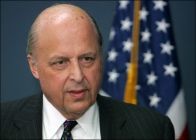US Negroponte tells Sudan of Darfur need for UN peacekeepers
April 13, 2007 (KHARTOUM) — The No. 2 U.S. diplomat told Sudanese officials on Friday that the humanitarian situation in the country’s violence-wracked Darfur region was so grave that a U.N. peacekeeping force was urgently needed.

It comes as the United States is holding off on imposing sanctions against Sudan to allow time for negotiations with al-Bashir’s government on allowing a U.N. force to join the undermanned 7,000 African Union troops currently protecting Darfur civilians.
Under a U.N.-backed agreement last fall, a hybrid force of 22,000 U.N. and African Union peacekeepers was to be deployed in Darfur to protect and provide relief for 2.5 million Darfurians, forced from their homes and confined to camps.
But al-Bashir has since rejected the deployment of U.N. troops, saying they would violate Sudan’s sovereignty. Many believe he fears the U.N. force would arrest Sudanese officials suspected in Darfur war crimes.
“The humanitarian situation in Darfur calls urgently for dispatching such a force, it is important that this be done as soon as possible,” Negroponte told reporters after talks with Foreign Minister Lam Akol.
“That is the basic message that am bringing with me, and this is the subject of discussion with the government of Sudan and other members of the international community,” Negroponte said.
More than 200,000 people have been killed in the four-year conflict in Darfur, which began when rebels from ethnic African tribes rose up against the central government. Khartoum is accused of having responded by unleashing the janjaweed militias of Arab nomads _ blamed for indiscriminate killing in Darfur. The government denies these charges.
Negroponte _ who is on a four-nation African tour _ was to hold talks with al-Bashir on Sunday, the day after his visit to Darfur. After talks with Lam, he left Friday for the southern Sudanese capital of Juba, where an autonomous administration has been in place since a 2005 peace deal ended two decades of civil war.
In what has been touted as a positive sign, Sudan’s government recently came closer to agreeing with the U.N. on a second phase of the agreement reached last fall. The phase calls for 3,000 U.N. military personnel and equipment, including six attack helicopters, to be provided to the AU force.
Sudan objected to the helicopters, but government spokesman Bakri Mulah said Friday night that the two sides were close to settling the dispute in negotiations in Addis Ababa, where the AU has its headquarters.
Mulah, the chief external spokesman of the Information Ministry, said the helicopter question was now for al-Bashir to decide, but “according to hints from the Foreign Ministry” an agreement is close.
Asked about Sudan’s objection to the helicopters, Negroponte said he “didn’t want to get into the details of a peacekeeping force” with the Sudanese.
“The principle purpose of my visit is to discuss with the authorities of Sudan the situation in Darfur and to convey the deep concern of our government for the grave humanitarian situation in that part of your country,” Negroponte told reporters.
But the Sudanese focused more on demands that Washington improve ties. Foreign Ministry spokesman Ali Al Sadeq said Khartoum sees the “need for normalization of relations between Sudan and the United States” since “normal relations do help in removing differences, and not the other way round.”
“This situation which the United States is trying to maintain is not in the interest of the relations between the two countries,” Al Sadeq said without elaborating.
Negroponte also was to stop in Libya, making him the highest ranking U.S. diplomat to visit Tripoli in more than half a century.
Raising new concerns for the troubled AU mission in Darfur, Senegal said Thursday it may pull its peacekeepers out, if the African Union is unable to ensure their safety. The move came after the deaths of five Senegalese peacekeepers over a week ago, bringing to 16 the number of AU peacekeepers killed in Darfur since their deployment three years ago. Senegal has about 500 troops in the AU force.
(AP)
